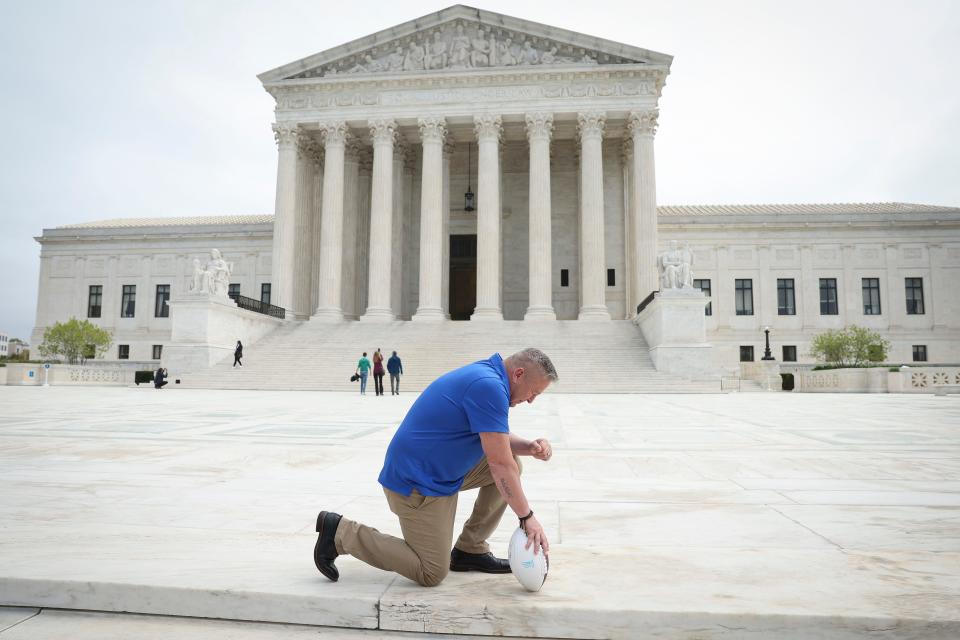Praying coach 'inexplicably indifferent' of players' needs despite court win| Opinion
Isaac Weiner is associate professor of comparative studies and incoming director of the Center for the Study of Religion at The Ohio State University. He is the author of "Author of Religion Out Loud: Religious Sound, Public Space, and American Pluralism."
In its recent decision in Kennedy v. Bremerton School District, the Supreme Court upheld high school football coach Joseph Kennedy’s right to pray at midfield following his team’s games.
It dismissed concerns about how his act might place pressure on his students or imply a public endorsement of Christianity.
The court focused only on his individual rights, not on how exercising those rights might affect others.
As constitutional law expert Jamal Greene has suggested, that’s partly a problem with the way we think about rights in this country. We presume them to be limited in number but absolute in power. If someone asserts a right, we take it to be non-negotiable, so we dedicate more time to debating whether something is a right than to figuring out how to mediate or compromise among competing interests.
More: Supreme Court to hear case of praying coach who lost his job after kneeling on the field
More: Supreme Court backs praying coach Joseph Kennedy who knelt on the 50-yard line after games
Yet that is not actually how things are supposed to go when it comes to religion in the workplace. It turns out there is a well-established process in place for accommodating religious practices at work that offers a more productive path forward.

Under Title VII of the 1964 Civil Rights Act, employers have an obligation to accommodate the religious practices of their employees unless doing so would incur an “undue burden.”
But in its published guidelines on religious discrimination, the Equal Employment Opportunity Commission emphasizes that employers are not obligated to accommodate the employee’s needs in precisely the manner requested. Instead, finding the proper accommodation is an iterative process that requires patience and flexibility on both sides.
Managers and employees are expected to communicate with each other about the nature of the problem and consider different options for resolving it.
More: Church has 'thrown us out into the cold, slammed the door in our bewildered faces' | Opinion
The goal is to find a mutually agreeable solution that takes all parties’ needs into account, including fellow co-workers.
More: How to submit guest opinion columns to the Columbus Dispatch
The Equal Employment Opportunity Commission's guidelines do not address the constitutional issues raised by Kennedy’s position as a public school official, but they are instructive nonetheless. They make clear that the assertion of a religious right should be the beginning of a conversation, not its endpoint. They direct us to consider not just what we are owed but also what we owe to others.
This is the kind of process that Coach Kennedy short-circuited by turning too quickly to the courts of law and public opinion.
He rejected the school district’s efforts to find a mutually satisfactory compromise. Instead, he went on a media blitz, insisting to local press that “only demonstrative prayer on the 50-yard line immediately after games” would do. Then he filed suit in federal court.
More: I know how coercive team prayers can be. Supreme Court wrong to side with coach Kennedy.
How might things have gone differently if Kennedy had been required to participate in a good-faith process of negotiation prior to seeking legal remedy?
What if he had taken the time to do the hard work of listening to his critics and responding to their concerns?

Unfortunately, we’ll never know because Kennedy chose a different path.
Intent only on asserting his own rights, to act and pray in the precise manner he wished, he refused to give any credence to the interests of others.
As a coach charged with caring for the needs of all of his players, he was inexplicably indifferent to their perspectives.
More: We are Muslims and Jews. We needed the Supreme Court to side with coach's Christian prayer.
That’s why I thought the most astute response to the Kennedy case came from my 12-year-old son.
Having just completed his first season of public school sports, as one of the only Jews on his seventh-grade baseball team, I wanted his take on Coach Kennedy’s act.
“How would you feel,” I asked him, “if your coaches kneeled in Christian prayer after every game and the rest of your teammates started joining in? Would you feel pressured to join, too?”
He looked at me blankly, thought for a moment, and then rejected the terms of my question: “My coaches would never do that,” he explained. “They’re like the nicest people in the world.”
Isaac Weiner is associate professor of comparative studies and incoming director of the Center for the Study of Religion at The Ohio State University. He is the author of "Author of Religion Out Loud: Religious Sound, Public Space, and American Pluralism."
This article originally appeared on The Columbus Dispatch: Opinion: Coach Joseph Kennedy did a disservice to players

